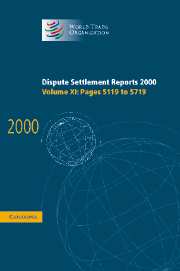Canada - Term of Patent Protection (WT/DS170/R): Report of the Panel
Published online by Cambridge University Press: 13 December 2017
Summary
INTRODUCTION
On 6 May 1999, the United States requested consultations with Canada pursuant to Article 4 of the Understanding on Rules and Procedures Governing the Settlement of Disputes (the “DSU”) and, to the extent that it incorporates by reference Article XXII of the General Agreement on Tariffs and Trade 1994, Article 64 of the Agreement on Trade-Related Aspects of Intellectual Property Rights (the “Agreement”, “TRIPS” or the “TRIPS Agreement”) regarding the term of protection granted to patents that were filed before 1 October 1989 in Canada. The United States and Canada held consultations on 11 June 1999 in Geneva but failed to reach a mutually satisfactory solution to the dispute.
In a communication dated 15 July 1999, the United States requested the Dispute Settlement Body (the “DSB”) to establish a panel under Article 6.2 of the DSU. Specifically, the United States alleged that the TRIPS Agreement requires Members to grant a minimum term of protection to all patents existing as of the date of application of the Agreement and that Canada has been obligated to apply the provisions of the TRIPS Agreement since 1 January 1996. The United States alleged that Canada's Patent Act provides that the term granted to patents issued on the basis of applications filed before 1 October 1989 is 17 years from the date on which the patent is issued and that granting of such term of protection is inconsistent with Canada's obligations under Articles 33 and 70 of the TRIPS Agreement.
At its meeting on 22 September 1999, the DSB established a Panel in accordance with Article 6 of the DSU with the following standard terms of reference:
“To examine, in light of the relevant provisions of the covered agreements cited by the United States in document WT/DS170/2, the matter referred to the DSB by the United States in that document and to make such findings as will assist the DSB in making the recommendations or in giving the rulings provided for in those agreements.”
On 13 October 1999, the United States made a request, pursuant to paragraph 7 of Article 8 of the DSU, to the Director-General to determine the composition of the Panel. On 22 October 1999, the Director-General composed the Panel as follows:
Chairman: Mr. Stuart Harbinson
Members: Mr. Sergio Escudero
Mr. Alberto Heimler
- Type
- Chapter
- Information
- Dispute Settlement Reports 2000 , pp. 5121 - 5294Publisher: Cambridge University PressPrint publication year: 2003
- 2
- Cited by



